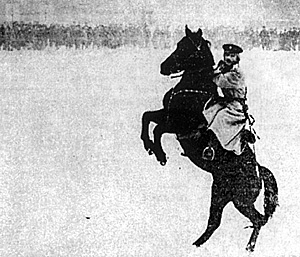 The conditions under which World War I was
fought were those of Nations at war as opposed to
the Napoleonic concept of Nations in arms and, more
important than their uniformed manpower, was a
Nation's ability to supply its fighting forces with
weapons and supplies.
The conditions under which World War I was
fought were those of Nations at war as opposed to
the Napoleonic concept of Nations in arms and, more
important than their uniformed manpower, was a
Nation's ability to supply its fighting forces with
weapons and supplies.
A classic example was that of Russia whose huge armies, consisting of millions of peasant conscripts were relatively ineffectual because it was not possible to arm and maintain them on the battlefields. In spite of having profited by the lessons of the war with Japan, there was still a great deal wrong with the Russian Army in 1914.
Because the Russian government were loath to give military training to more people than was absolutely necessary, the call-up was small in comparison with the availability of numbers so that a great majority of young men of military age were completely 'without military training. There was a shortage of Reserve officers and no system of military training camps where conscripts could be given a short concentrated course of training.
The German victory at Tennenberg in 1914, although one of the most striking and brilliant victories of the war, did not have such a decisive effect upon the Russians as generally believed and they were able to invade East Prussia again at a later date. Had the Germans lost the battle it would have been far more decisive and the future course of the war would undoubtedly have been altered.
At this stage on the Eastern Front, the Germans had two brilliant corps commanders in Von Below and von Francois whereas the primitive disorganised Russians could produce only one first-class leader, Martis, who commanded XV corps. The tough and unshakable Hindenberg resisted the impulse to influence his quick talented but mercurial subordinate Ludendorff who generally received credit for the victory although the battle was planned by Hoffmann and mainly won by von Francois, said to have been prevented from ever rising above the rank of Corps Commander through Ludendorff's jealousy. Von Below, on becoming a Group Commander, emerged as one of the best generals on the German side during the war. At Tannenberg, the Russians fielded some 250 battalions against the German's 144 but the Germans had a much higher proportion of guns to battalions and were ten times stronger in heavy artillery. Russian communications were primitive, in simple breakable codes or in clear. It is said that the greatest German handicap was one of their senior generals Prittwitz.
Back to Table of Contents -- Wargamer's Newsletter # 174
To Wargamer's Newsletter List of Issues
To MagWeb Master Magazine List
© Copyright 1976 by Donald Featherstone.
This article appears in MagWeb.com (Magazine Web) on the Internet World Wide Web.
Other articles from military history and related magazines are available at http://www.magweb.com